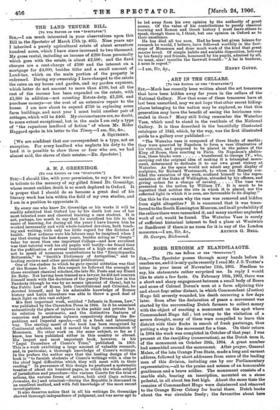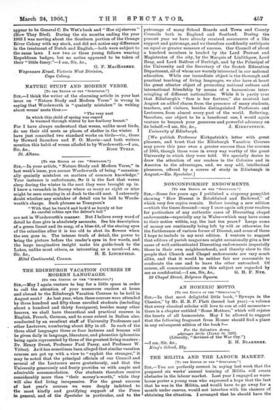BOER HEROISM AT ELANDSLAAGTE.
rTo TEE EDITOR OP THE "SPECTATOR:] SIR,—The Spectator passes through many hands before it reaches me, and it is only quite recently I read Mr. J. S. Trotter's letter in your issue of November 11th, 1905. Needless to say, his statements rather surprised me. In reply I would like to state a few facts. On February 18th, 1902, there was a short and sharp engagement between a small body of Boers and some of Colonel Doran's men at a farm adjoining this and about four miles' distant, is which Commandant (Justice) Hugo fell severely wounded, his death occurring a few days later. Soon after the declaration of peace a movement was started by the surrounding Dutch farmers to collect money with the object of erecting a monument on the spot where Commandant Hugo fell ; but owing to the visitation of a severe drought, many of them were compelled to leave this district with their flocks in search of fresh pasturage, thus putting a stop to the movement for a time. On their return in 1904 the work was completed in October of that year. I was present at the inwijding (consecration), as the Dutch term it, of the monument on October 20th, 1904. A great number had assembled around the monument. After prayer, General Malan, of the late Orange Free State, made a long and earnest address, followed by short addresses from some of the leading men of this division, including one by our Parliamentary representative,—all to the praise and esteem of an honourable gentleman and a brave soldier. The monument consists of a marble slab, bearing an inscription, mounted on a stone pedestal, in all about ten feet high. About the same tinle the remains of Commandant Hugo were disinterred and rAmoved to the Orange River Colony for burial there. Dutch books about the war circulate freely ; the favourites about here
appear to be General C. De Wet's book and " Hoe zij sterven " (How They Died). During the six months ending the year 1903 1 was moving about the Southern portion of the Orange River Colony with my stock, and did not notice any difference in the treatment of Dutch and English,—both were subject to the same laws. I saw two or three young fellows wearing Republican badges, but no notice appeared to be taken of their " little fancy."—I am, Sir, &c., G. F. MAcRonscns.
Wagenaars Kraal, Victoria West Division, Cape Colony.











































 Previous page
Previous page